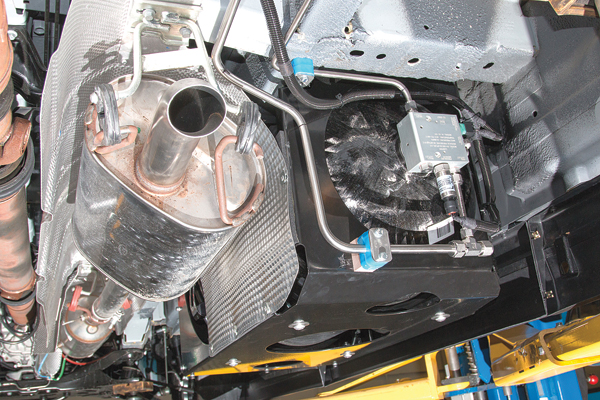Nations collaborate on low-emission vehicles
Vehicles powered by hydrogen-the world's most abundant element-have moved of the pages of science fiction novels and into the real world in recent years and China and the UK are driving forward with efforts to make the technology mainstream.
|
 |
| A hydrogen cylinder is bolted into the engine of a van to the right of the exhaust pipe. |
In collaboration with the University of Liverpool and Huazhong University's Wuhan New Energy Institute, Liverpool-based technology firm ULEMCo will lead a project that aims to facilitate the mass production of hydrogen-fueled vehicles in China, as the country looks to curb carbon emissions.
The project will focus primarily on the application of hydrogen technology for commercial vehicles. While the market for passenger cars that run on electricity is growing rapidly, power-intensive heavy-duty vehicles remain some of the worst carbon emitters. ULEMCo specializes in low-emission technology, and has developed a compression engine that mixes diesel and hydrogen, slashing emissions in vans and heavy-duty vehicles by up to 70 percent.
"China is embarking on radical investment in hydrogen infrastructure," ULEMCo Managing Director Amanda Lyne told China Daily. "And it goes hand-in-hand with electric, they are both part of the solution. China gets where hydrogen can fit into the system."
Last September, the Chinese government signed a deal with Tongji University and the China University of Geosciences to set up a joint $30 million fund for investment in hydrogen-fueled vehicle technology.
The project will run for two years, with 2 million pounds ($2.5 million) of funding coming from Innovate UK and the Government Newton Fund. The fund invests specifically in cross-country science and technology partnerships.
One of the main advantages of ULEMCo's engines is they can run solely off diesel if hydrogen is unavailable. The project will look into the development of a refueling infrastructure in China and the generation of hydrogen through processes that use locally sourced renewable energy.
"It's a fabulous opportunity for us as an SME," said Lyne. "We have an ambition to have a market in China and we also recognize the opportunity for China. It's a win-win." Lyne said the aim is for fuel to be made out of local renewables.
"Some might make it from solar, some wind or another. The cost of making that energy is not going to be dependent on global markets for the hydrocarbons that we all rely on. We will become more resilient, more secure."






















